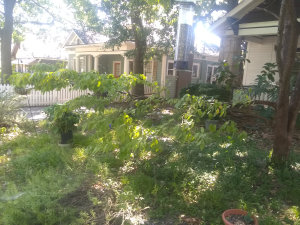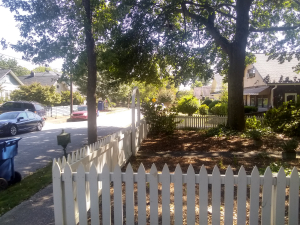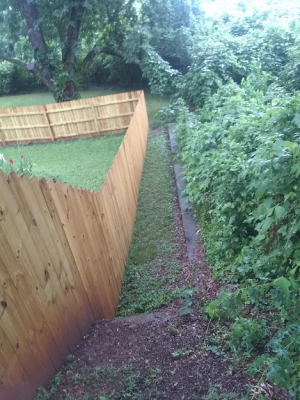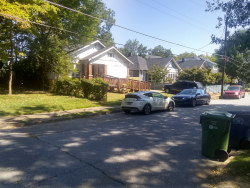
Perhaps the most important day on my trip will be September 28, when I’m due to see my daughter in Vienna.
It’s not just important because I love her. It’s important that I check in with her regarding the most important issue facing mankind, climate change.
My daughter has been studying most of her life to be on the front lines of the battle. But what I’m finding is that the key to this battle may be right back here, in what was her front yard. If you want to know whether the climate crisis can be overcome or not, that’s where to start.
My daughter’s focus has been on urban animal policy. It sounds arcane, but it’s not. Whether or not we admit it, our cities and suburbs are part of nature, just as our forests and beaches are. They are ecosystems, where plants and animals live or die depending on our actions.
In Atlanta, that battle is being lost.

It’s a welcoming place for wild animals. When people walk along my sidewalk their dogs often stop to smell the plants, and the other creatures that have come by. The people seem happy to let the dogs stop, and I sometimes see secret smiles on their faces.
We have a wide variety of birds, we have squirrels, we have chipmunks. We have rabbits, raccoons and opossums. When our kids were little, we kept chickens. All this is within a few hundred feet of a train station that can get me to the Airport in 40 minutes.
Most of my neighbors think I’m a nutburger. They all keep monocultures of very specific, thin-bladed grasses, not even native species, in their front yards. Most are behind fences, so no one else can walk on them. They come out every evening and spend a half-hour watering these putting greens, along with water-loving plants along the verge. I come out too, every few days, filling some watering cans from a cistern when the bird bath gets low or the coffee plant droops.

There are other threats. Weed killers, the sound of leaf blowers, the drone of lawn mowers, they all try to tame the environment in such a way as to make natural life impossible. Yet still it comes. There are armadillos moving up from Florida, deer coming in from every direction, herds of wild hogs in the suburbs, coyotes coming in from the West. I don’t know exactly what to make of it. Maybe my daughter can tell me.
That’s just half of it.
Then there are the development pressures. Many neighbors have already taken up their backyards for additions. The city no longer minds two-story garages that turn single family lots into two-family lots, with a mother in law, a college student, or (eventually) just a renter. Everyone is hot for “workforce housing.” They want to develop the nearby MARTA station, going wall-to-wall with 5 stories of apartments and parking decks. Bottom lands, the lifelines of wildlife, are being taken up, the rainwater forced into drains and pipes. This causes streambanks downstream to deteriorate rapidly. Besides, pipes collapse, pipes get clogged. And if you complain they’ll accuse you of NIMBYism, perhaps the worst crime in a modern hipster’s vocabulary. Might as well put a Trump sign on my lawn, they figure.
Development is making Atlanta a heat sink. We’re supposed to be a forest, but just try to find shade on your daily walk. Trees don’t just clear carbon from the atmosphere. They cool the land beneath, and everything on that land. Leave the shade on a summer day and you’re 10-15 degrees hotter. You’re in the desert. The paths rainwater needs to take are ignored. We build lots wall-to-wall, so streets and yards downstream are flooded out with every rain. And the severity of those rainstorms we get is increasing.
No, I won’t move out to the suburbs, where I must drive everywhere, and face even larger monocultures, more leaf blowers and bigger loan mowers. This is where the environmental battle will be fought. We live or die right here, in the city.
What do I want?

I want my neighbors’ kids to know that nature is red in tooth and claw, that evolution is everywhere, and that we’re a part of it, not something separate and apart. I want urban nature to be balanced, between predators and prey. I want pesticide use reduced, and natural replacements found for them, insects and birds eating animals, animals eating other animals.
Once we understand that we’re all part of nature, that the area around our homes and offices is a natural world, not just for the use of ourselves and our machines, then we might tackle the climate crisis with a full heart and a clear conscience.
But if we’re not willing to do even that, I know what God’s response is going to be.
To hell with us. Let the fever run. Let this species be burned out. Let’s start over again. Maybe the rats will prove smarter, the cockroaches more tolerant, of what nature demands.










